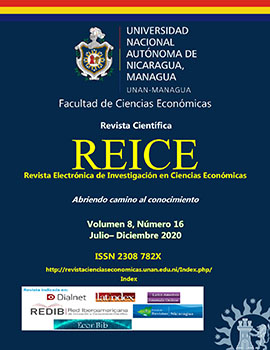The Role Of Financial Institutions In The Development Of Innovation In Russia
DOI:
https://doi.org/10.5377/reice.v8i16.10702Keywords:
venture financing, investment, industrial enterprises, business, innovative development.Abstract
Innovative development of Russia is a key priority in the context of the complicated macroeconomic situation in the country, increased geopolitical risks and serious global economic challenges. Russia was in the top 60 in the innovation ranking of countries until 2018, according to the results of which it, ranked 49th, rising 13 points compared to 2017. The goal set in the Strategy for Innovative Development of Russia to increase the share of industrial enterprises implementing technological innovations to 50% by 2020 requires not so much a large-scale financial flow as new incentives and instruments for financing innovation, with a focus mainly on the early stages of business development.There is an obvious need for alternative tools for financing innovations, such as crowdfunding, which combines the achievements of openness of the Internet space and the ability to use free financial resources of the population. Today, there is a historical moment in the formation of a new financial instrument, and it is important to support crowdfunding at the beginning of its development. According to World Bank estimates, investments through crowdfunding will amount to about 96 US Dollars Billion by 2025 (an increase of 30 times since 2012), which is double the global market for venture financing.
Downloads
590
Downloads
Published
How to Cite
Issue
Section
License
Copyright (c) Revista Electronica de Investigacion en Ciencias Economicas
The rights to the articles published in REICE are from the journal, in order to be able to manage their best dissemination. However, since the purpose of the same is the dissemination of knowledge, this journal provides immediate free access to its content, under the principle that making research available to the public free of charge, which fosters a greater exchange of global knowledge.
The opinions expressed by the authors do not necessarily reflect the position of the publisher of the publication or of the UNAN-Managua. Its reproduction and distribution is authorized (in any type of support) provided that the following indications are fulfilled:
- The authorship of the work
- Indicate its origin (REICE magazine, volume, number and electronic address of the document)

